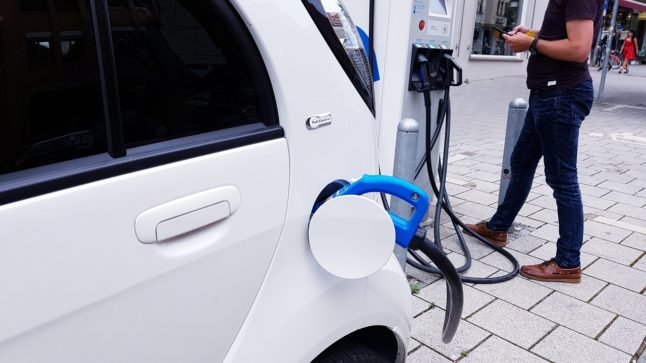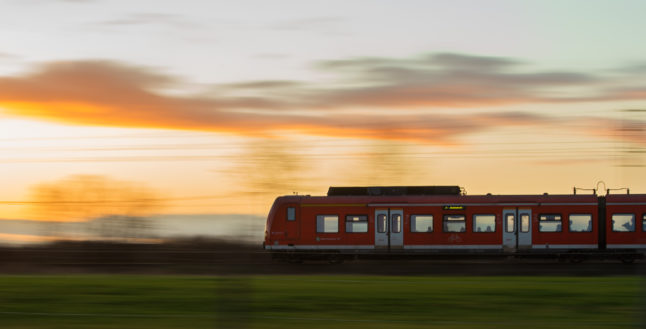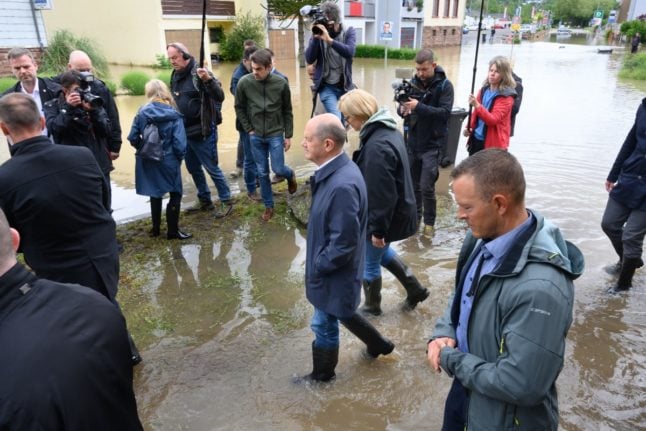From more money for train travel to bolstering the number of e-cars: following marathon talks Tuesday, Germany’s coalition government agreed on a package of plans to advance climate protection, especially in transport – as the sector is still lagging behind in reducing greenhouse gasses.
The package also includes changes to the truck toll to finance railway projects and accelerated planning to eliminate congestion on motorways.
However, many climate activists said that the plans, which among other things abandoned proposals to impose a ban on new gas or oil heating systems from 2024, don’t go far enough.
READ ALSO: Activists accuse German government of climate climbdown
What is planned for rail travel?
Train travel in Germany is set to receive more funding to repair and expand the worn and breakdown-prone track network. The coalition is aiming to inject €45 billion into Deutsche Bahn by 2027, which is to be covered “as far as financially feasible”.
The government’s stated priority is to ensure that there’s enough capacity for freight and passenger trains to run smoothly across the country’s most important – and often busiest – routes.
Deutsche Bahn CEO Richard Lutz said these were “crucial points” needed to achieve growth targets for train travel and improve the currently “unsatisfactory” punctuality of trains.
Where will the extra money come from?
Part of the funding for Deutsche Bahn will come from the lorry toll. The coalition expects €5 to €6 billion per year for train travel to come from this new source – regardless of the government’s budget situation.
The remaining billions, however, still have to be secured.
What else will be changed in the lorry toll?
The lorry toll, which is due on all motorways and federal roads for lorries weighing 7.5 tonnes or more, is also set to be extended. From 2024, smaller vehicles weighing 3.5 tonnes and above will also have to pay to share the road. These include, for example, vans used by parcel delivery services.
To what extent higher costs for haulage companies will ultimately be reflected in customer prices is still up in the air. However, the government’s plan paper explicitly states that “craft businesses will be exempt” from extra costs.
What else is in store for railway customers?
The future €49 ticket for buses and trains throughout Germany is to be integrated into the Bahncard 100 at no extra charge, meaning that it can be used in local transport in all cities.
This is aimed, however, at only the most frequent travellers who have the pricey annual flat-rate card which can be used on all trains, high-speed ICE ones included. The cost for an annual second-class ticket: €4,339.
Germany’s coalition government also stressed that they were working to expand local transport services “especially in suburban and rural areas”.
READ ALSO: Why Germany wants families to move to the countryside
What is planned for car drivers?
For the big goal of 15 million fully electric vehicles by 2030, the coalition is pushing for e-cars to become more attractive. At the beginning of 2023, only about one million passenger cars with batteries were registered.

To this end, there is to be at least one fast-charging point at every major petrol station within five years, regulated by an obligation on the part of the operators.
Parking spaces at airports, railway stations and retail outlets will also be required to have openly accessible charging points.
When buying a car, the energy consumption labelling (“climate label”) should make it clearer what the burden is over the vehicle’s entire life cycle.
The coalition government also wants to tackle the taxation of fuels and take greater account of the “environmental and climate impact”.
How will heating become more environmentally friendly?
A year ago, the coalition government agreed that from January 2024, every newly installed heating system should be 65 percent powered by renewable energies.
READ ALSO: How renters in Germany could get help with rising heating costs
A first draft of the legislation, however, triggered protests, especially from the business-friendly FDP. Consumer associations also said that clarity was needed as to how binding renewable energies would be connected to boiler rooms from 2024, and if people with lower income would qualify for financial support to install the new systems.
FDP leader Christian Lindner also called for clarity on what “renewable energy” means, and if heating systems with fossil fuels should be able to continue to operate if they run on climate-friendly gases.



 Please whitelist us to continue reading.
Please whitelist us to continue reading.
Member comments